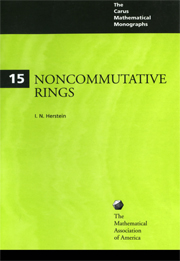6 - POLYNOMIAL IDENTITIES
Summary
As we have indicated earlier on several occasions the general structure theory developed in the first two chapters reveals itself most effectively in the study of rings which are further restricted by some sort of polynomial condition. A good instance of this was seen in the study of the commutativity of rings.
We now pass to a class of rings—in some sense they satisfy a higher form of commutativity—which on analysis are capable of a sharp description. These rings are subjected to the presence of some nonzero polynomial relation in noncommuting variables, which vanishes identically on them. The entry into their study is via an incisive result due to Kaplansky (Theorem 6.3.1).
This area has been studied from many points of view and with many diverse goals. For instance, much work has been done by Amitsur and Levitzki in investigating the nature of the minimal identities satisfied by certain well known rings. Our goal is in another direction; we seek to develop enough of the material to be able to settle the Kurosh problem for this family of objects.
A result on radicals. We begin the discussion with a result which is needed for the study to be made but which in spirit is very little related to it.
- Type
- Chapter
- Information
- Noncommutative Rings , pp. 150 - 168Publisher: Mathematical Association of AmericaPrint publication year: 1968

